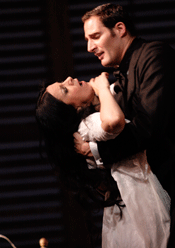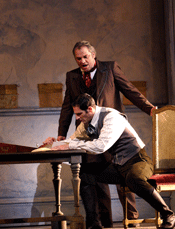Benjamin Britten was
said to listen to the music of Brahms once a year, to remind him why he loathed
it. (Oddly, however, there is a recording of the op.52 Liebeslieder
Waltzes from Aldeburgh.) In a similar spirit, although on a considerably
broader timescale, I considered that it would do me no harm to put my
prejudices or judgements to the test.
There would be many worse ways of doing so than seeing Angela Gheorghiu as
Violetta. I had not actually heard her in the flesh before and was a little
surprised as to how small her voice is. She made it work though, so that it
could be heard perfectly well even when singing pianissimo. Her
coloratura was, so far as I discerned, flawless, no mean feat. I recall
watching this production on the television as a schoolboy, the first run under
Solti which really made Gheorghiu’s name. She obviously does not look
— or sound — so young now, but this remains still a fine vocal
performance. In terms of playing herself on stage she is also clearly without
peer; Angela Gheorghiu is a role one is tempted to think she was born to play.
Certainly one had the impression, rightly or wrongly, that her movements, her
expressions, pretty much everything she is doing — all these are very
much her own thing.
 James Valenti as Alfredo Germont and Angela Gheorghiu as Violetta ValÈry
James Valenti as Alfredo Germont and Angela Gheorghiu as Violetta ValÈry
Given the conservatism of Eyre’s production, and especially of Bob
Crowley’s designs, that is not necessarily so bad thing. Zeffirelli with
a slightly lower calorie count doubtless appeals to some even on this side of
the Atlantic, but there is suspension of disbelief and then there is the size
of Violetta’s bedroom in act three of this production. Otherwise, the
costumes look beautiful and so forth, but it is really only the presence of the
soprano that grants any sense of theatre at all: ironic, since that then
reinforces the idea that opera should be about star singers and therefore about
works like this, and a vicious, doubtless highly commercial circle ensues. I
can only assume, moreover, that some deal had been struck with the Association
of Consumptives, for the state of the audience made poor Violetta seem hale and
healthy.
James Valenti looked good as Alfredo and sang ardently, but often wavered in
intonation. There was strength in the singing of Željko Lučič
as Germont pËre, though his stage presence was somewhat wooden (how
much is the production at fault here?) and his style sounded just a touch
incongruously Slavic. The choral singing was excellent, for which thanks must
once again go to Renato Balsadonna and of course the Royal Opera Chorus itself.
And the orchestra played beautifully, Yves Abel directing unobtrusively but not
without character.
 James Valenti as Alfredo Germont and éeljko Lu?i? as Giorgio Germont
James Valenti as Alfredo Germont and éeljko Lu?i? as Giorgio Germont
There remains the work itself. I tried, but the esteem in which it and
Verdi’s œuvre in general are held continues to baffle me. Puccini
can be mawkish, Rossini can be shallow, but there is a degree of craftsmanship
to be heard and admired there. Verdi seems to combine the worst aspects of
both, standing perhaps slightly above Donizetti, but that is all. The
orchestration is often rudimentary — though, as I said, the orchestra
made the most of what it had. Harmony is uninteresting and the accompaniments
— the word for once is apt — are often so derisory. And then there
is the ‘tart with a heart, transfigured’ tale: does it go beyond
the level of a women’s magazine story? I fail to see how — and it
now seems utterly dated, not least in its attitude towards gender. Just when
one thinks there might be some psychological insight, the music of the pizza
parlour returns. The ‘tunes’, memorable because one hears them so
often, are rarely integrated into the musical texture, such as it is, let alone
into the drama, such as it is. Given the lack of musical interest, surely a
more adventurous production might alleviate the ennui.
Regietheater seems a necessity here. Were this a neglected work, one
could understand someone thinking it worth a try, but a staple of the
repertoire? Some people might, for a variety of reasons, dislike Wagner; but
being something other than Wagner is not in itself a guarantee of anything. As
Pierre Boulez once put it, Verdi is ‘picture-postcard music’. He
said that he would prefer to see a whole landscape; the same goes for me.
Mark Berry
image=http://www.operatoday.com/Gheorghiu_Traviata_ROH_2010.gif
image_description=Angela Gheorghiu as Violetta ValÈry [Photo by The Royal Opera/ Catherine Ashmore]
product=yes
product_title=Giuseppe Verdi: La traviata
product_by=Violetta ValÈry: Angela Gheorghiu; Alfredo Germont: James Valenti; Giorgio Germont: Željko Lučič; Baron Douphol: Eddie Wade; Doctor Grenvil: Richard Wiegold; Flora Bervoix: Kai R¸¸tel; Marquis d’Obigny: Changhan Lim; Gastone de LetoriËres: Ji-Min Park; Annina: Sarah Pring; Giuseppe — Neil Gillespie; Messenger: Charbel Mattar; Servant: Jonathan Coad; Ladies and Gentlemen, Friends of Violetta and Flora, Guests, Servants. Director: Sir Richard Eyre; Designs: Bob Crowley; Movement: Jane Gibson; Lighting: Jean Kalman. Royal Opera Chorus and extra chorus (chorus master: Renato Balsadonna); Orchestra of the Royal Opera House; Yves Abel (conductor).
Royal Opera House, Covent Garden, London, 8 July 2010
product_id=Above: Angela Gheorghiu as Violetta ValÈry
All photos by The Royal Opera/ Catherine Ashmore